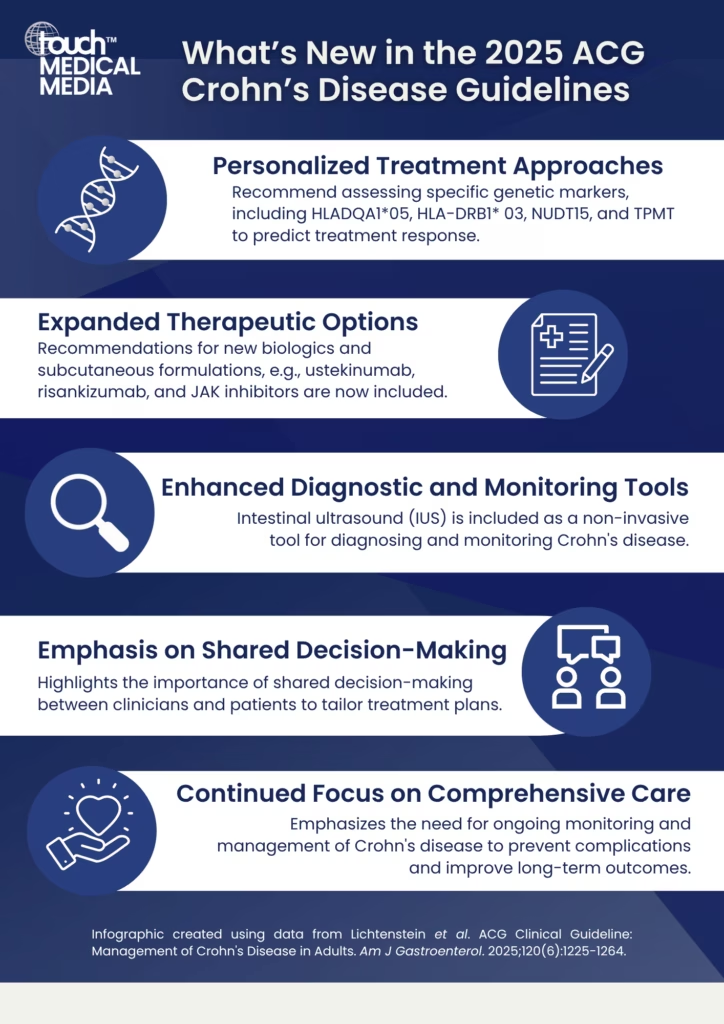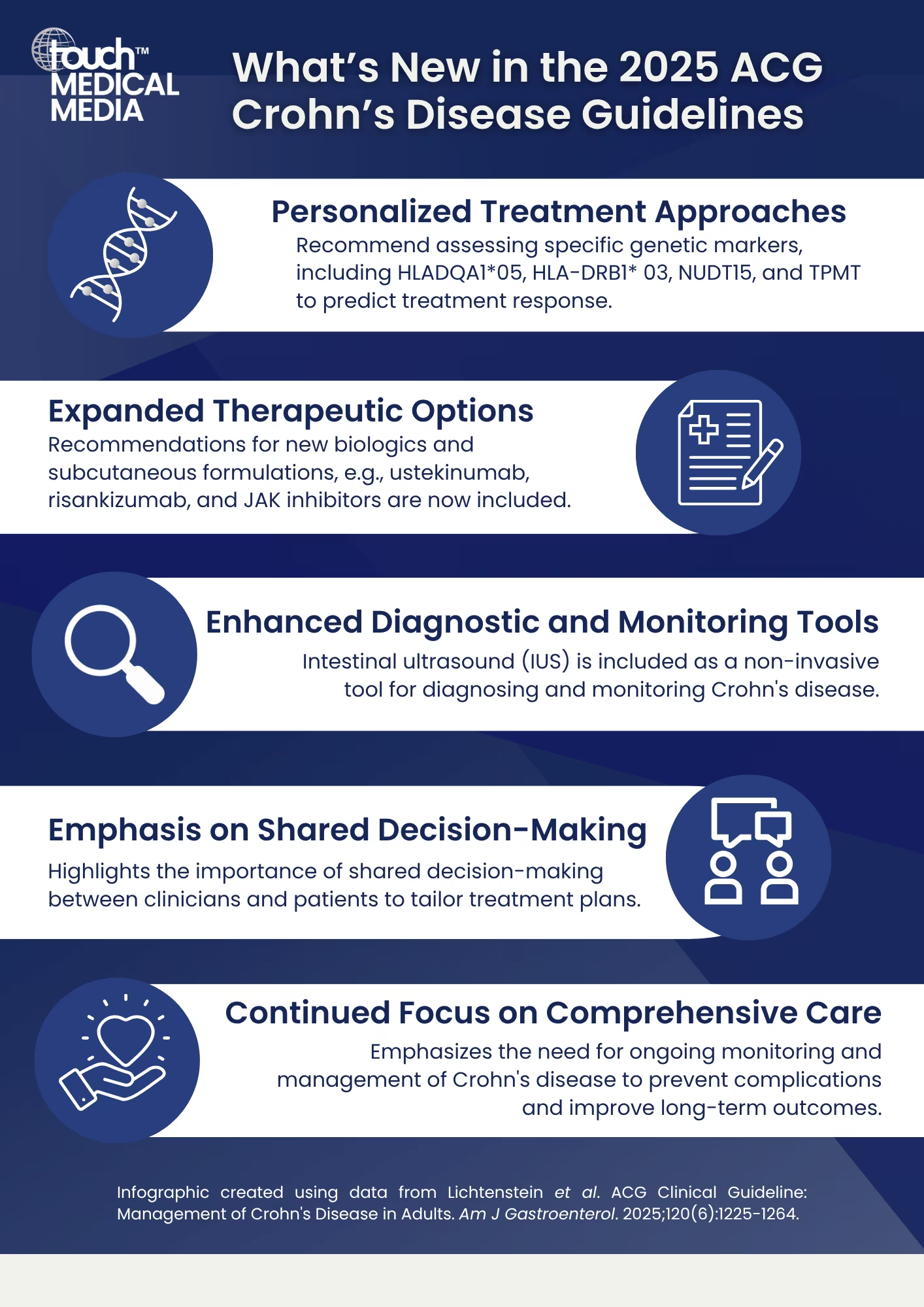The American College of Gastroenterology (ACG) has released its 2025 update to the Crohn’s disease (CD) guidelines, introducing several important advancements aimed at improving patient outcomes through personalized approaches, enhanced diagnostics, and expanded treatment options.1 Here’s a look at the key updates and what they mean for patients and clinicians alike.
 Personalized treatment approaches
Personalized treatment approaches
The 2025 guidelines mark a significant shift toward precision medicine in Crohn’s disease management. For the first time, assessing specific genetic markers, such as HLADQA1*05, HLA-DRB1*03, nudix hydrolase 15 (NUDT15), and thiopurine methyltransferase (TPMT), is recommended in select patients. These markers can help predict individual responses to certain therapies, allowing clinicians to tailor treatments more effectively. This personalized approach aims to optimize therapeutic outcomes by considering each patient’s unique genetic makeup, potentially improving efficacy and minimizing adverse effects.
Enhanced diagnostic and monitoring tools
The guidelines now include intestinal ultrasound (IUS) as a valuable, non-invasive, radiation-free tool, recommended as an adjunct to diagnosing and monitoring Crohn’s disease. IUS provides real-time assessment of bowel inflammation and disease activity without the discomfort or risks associated with invasive procedures. This addition allows for more frequent, patient-friendly monitoring and can guide timely adjustments in therapy.
Expanded therapeutic options
One of the most notable updates is the expanded therapeutic armamentarium, particularly the integration of IL-23p19 inhibitors, such as mirikizumab, which received FDA approval in early 2025 for the treatment of moderate-to-severe Crohn’s disease.2 The guideline acknowledges that the growing range of biologics and small molecules, including ustekinumab, risankizumab, and janus kinase inhibitors, requires thoughtful consideration of drug selection based on disease phenotype, extraintestinal manifestations, safety profile, and patient preference. Therapeutic strategies should be tailored to each individual, aiming to achieve both clinical and endoscopic remission, while minimizing significant treatment-related side effects.
Emphasis on shared decision-making
Reflecting a patient-centered care philosophy, the guidelines underscore the importance of shared decision-making. Healthcare providers are encouraged to actively involve patients in treatment choices, considering their preferences, values, and lifestyle factors. This flexible, individualized approach recognizes that optimal care goes beyond clinical factors alone and supports collaborative partnerships between patients and clinicians.
Continued focus on comprehensive care
Finally, the guidelines reinforce the critical need for ongoing monitoring and holistic management of Crohn’s disease. Attention to preventing complications and addressing long-term health risks remains a priority, including recommendations to manage stress, depression, and anxiety, and to quit smoking. The guidelines also recommend viewing the routine use of nonsteroidal anti-inflammatory drugs (NSAIDs) with caution, as this may exacerbate disease activity. The comprehensive care model promotes sustained disease control and improved quality of life through regular assessment and timely intervention.
In summary, the 2025 ACG Crohn’s disease guidelines bring personalized medicine to the forefront, integrate innovative diagnostic tools, expand the arsenal of effective therapies, and highlight patient engagement in care decisions. These updates represent a major step forward in tailoring treatment to individual needs and improving outcomes for those living with Crohn’s disease.
References
- Lichtenstein GR, Loftus EV, Afzali A, et al. ACG Clinical Guideline: Management of Crohn’s Disease in Adults. Am J Gastroenterol. 2025;120(6):1225-1264.
- Eli Lilly and Company. [Press release]. FDA approves Lilly’s Omvoh® (mirikizumab-mrkz) for Crohn’s disease, expanding its use to the second major type of inflammatory bowel disease. 2025. Available at: https://investor.lilly.com/news-releases/news-release-details/fda-approves-lillys-omvohr-mirikizumab-mrkz-crohns-disease (accessed 3 July 2025).
Further content in IBD, paediatric gastroenterology and digestive disorders.
Editor: Victoria Smith, Senior Content Editor.
Disclosures: This short article was prepared by touchIMMUNOLOGY. touchIMMUNOLOGY utilize AI as an editorial tool (ChatGPT (GPT-4o) [Large language model]. https://chat.openai.com/chat.) The content was developed and edited by human editors. No fees or funding were associated with its publication.
Cite: What’s New in the 2025 ACG Crohn’s Disease Guidelines: Personalized Care and Advanced Therapies. touchIMMUNOLOGY. 16 July 2025.
SIGN UP to TouchIMMUNOLOGY!
Join our global community today for access to thousands of peer-reviewed articles, expert insights, and learn-on-the-go education across 150+ specialties, plus concise email updates and newsletters so you never miss out.



